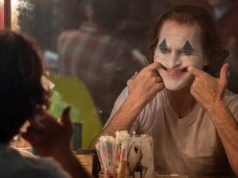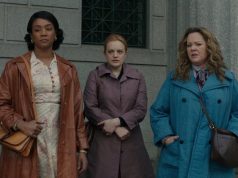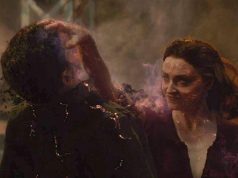What a mess “Fantastic Four” is. Everything about it bears the stench of amateurs, from the unspectacular special effects to the sitcom-lame dialogue to the butchered storyline. Hard to believe that in one 15-month period we have endured “The Punisher,” “Elektra,” “Catwoman” AND “Fantastic Four,” the four very worst comic book adaptations, all lined up. We deserve medals, you and I.
Most of this film, directed by Tim Story — whose experience with the lightweight comedies “Barbershop” and “Taxi” somehow failed to prepare him for a big-budget superhero adventure — has a tone to it that is utterly wrong. It’s too silly to be taken seriously, but not silly enough to be funny. It feels inconsequential, weightless even, like nothing that happens really matters.
This is exactly the opposite of how a superhero movie should feel, of course. You want the audience to be afraid when the hero is in peril and cheer when he prevails. I just kept looking at my watch.
It’s an origin story, obviously meant to presage further adventures in the hopes that sequels would be forthcoming. (I suspect they shan’t be.) Scientist and inventor Reed Richards (Ioan Gruffudd) wants to do research on solar winds for the purpose of curing diseases, or some kind of crap like that, so he secures funding from business tycoon Victor Von Doom (Julian McMahon), his old MIT classmate and romantic rival, and a space mission is planned.
Victor’s head of research and current girlfriend (and Reed’s ex) is the beautiful, allegedly brilliant Susan Storm (Jessica Alba), so she has to go into space with them, and so does her brother, the hot-headed NASA drop-out Johnny Storm (Chris Evans), because he’s Victor’s spaceship pilot. Reed insists on bringing HIS pilot, Ben Grimm (Michael Chiklis), and so now there are five. Of course, I don’t know why Victor is going at all, since he’s not planning to do any actual work. Just likes going into space, I guess.
Anyway, in space there’s trouble and they all get blasted with some kind of special effect, and when they get back to Earth they have superpowers. Because Fate has a sense of humor, their powers relate to their personalities. Fast-living Johnny now has the ability to be on fire, Susan the overlooked brainiac (what? really?) can turn invisible, over-worked Reed can stretch his body into infinite shapes and sizes, and the stubborn, immovable Ben is now made of rocks. Oh, and Victor has some kind of electromagnetic thing going on, and he’s slowly turning into pure steel — which of course is cold and dead like his heart.
The film has been awkward to this point, with weak, junky dialogue (by Mark Frost and “Punisher” screenwriter Michael France) and far too much emphasis on the Victor/Susan/Reed triangle. But when the Four’s powers manifest themselves, that’s when things really fall into the crapper.
First, Ben starts to turn into nothing but rocks, and as soon as he does — like, the very MINUTE it happens — he doesn’t talk to his scientist friends to see what’s up, he doesn’t stop and reflect, he doesn’t even scream and cry. Instead, he breaks through a wall and goes lumbering into the night, somehow gets from Switzerland (where the hospital is) back to New York City — what, on a plane, when he’s made of rocks? — to his apartment, where he tries to call his wife from the pay phone outside, but his giant stone fingers are too big, just like the time Homer Simpson got super-fat and the telephone voice told him, “The fingers you have used to dial are too fat. To obtain a special dialing wand, please mash the keypad with your palm now.” I totally love that episode. But anyway, finally Ben’s wife comes outside in her nightie, and she is so repulsed by him that she flees, which I guess I can understand, but you’re not exactly a box of chocolates yourself there, sweetie.
The next day, Ben causes a major car wreck on a bridge, endangering the lives of many innocent people. His superpowered friends arrive just in time to help him save the day, fortunately. And his wife shows up, too, despite traffic being completely stopped on the bridge, just so she can give her wedding ring back to him. And all the news crews are there, too, again despite traffic being stopped and despite the entire event transpiring over the course of only a few minutes.
Immediately after this, the Four go into seclusion so Reed can figure out how to reverse the damage done by the special effects on the spaceship. Johnny doesn’t want his powers reversed, though; he digs being on fire, and he’s learning to fly, too. So there is a lot of bickering and in-fighting among them. When they do appear in public again, they find that, even though they’ve done no interviews and have made contact with no one since the bridge incident, they are all somehow household names and are recognized by people on the street. There’s even a marketing department, somehow, that has made a prototype of a Ben Grimm action figure. All of this based on one incident that none of them have talked about publicly since it happened.
Meanwhile, Victor is mad at the Four and wants to kill them. This is by default, really; he has no real reason for wanting them dead, but the movie needs him to want them dead, so he does. He tries to turn them against each other — which isn’t hard, given the tension that already runs among them — and plots their individual demises.
That angle is the film’s ultimate undoing. Victor doesn’t want to rule the world or murder civilians or destroy national landmarks; he just wants to kill the Fantastic Four. Not only is this an awfully low-stakes goal for a comic-book villain, but it means the Four’s stopping him isn’t even heroic. Thwarting the bad guy because he was going to kill you? Good for you, but so what? Not exactly the work of a superhero, saving your own life. I’ve managed not to be murdered by anyone so far, too, and no one’s making an action figure out of me.
In the comic books, I guess Victor Von Doom is from a fictional country called Latveria. The way the movie tells us this is that, halfway through, an embittered business colleague tells him, “Maybe you should go back to Latveria.” And we’re like, “What? What’s ‘Latveria’? Is that a country? Is he from there? Why doesn’t he have a Latverian accent, then? How did he get into MIT? Student visa?”
Later, when his face starts to become too metallic to be pretty anymore, Victor puts on a steel mask that was given to him by the people of Latveria as a thank-you present for something. It is frightening and monstrous, this mask, and cannot possibly have any native cultural significance, unless Latveria is a nation of robots. But hey, in the comic books Dr. Doom wears a metal mask, so I guess he’d better get one somehow.
This is the kind of movie where a computerized voice tells you obvious things. Like when they’re on the spaceship, someone opens the viewing station shield, and as the viewing station shield opens, a voice says, “Opening viewing station shield.” Oh, really? Thanks, computer voice. I went blind for a minute there and didn’t see the viewing station shield opening.
The best movies make even the most extraordinary fantasies seem possible, and there is always an internal logic to them. The tagline for the original “Superman,” after all, was, “You’ll believe a man can fly.” That was the movie’s selling point: that Superman seemed real. Believability is the great strength of “Batman Begins,” too, and of course the “Spider-Man” films excelled at making Peter Parker a normal human being who behaved the way a normal person would behave if he were suddenly given remarkable powers.
“Fantastic Four” shows people who were two-dimensional to begin with behaving unrealistically when given ridiculous superpowers. Not a minute of it feels natural. As with many bad movies, it’s a matter of plausible vs. possible. It’s not just that what happens in this movie could never happen in real life. It’s that if it DID happen, the people wouldn’t react the way they do here.
D+ (1 hr., 45 min.; )





